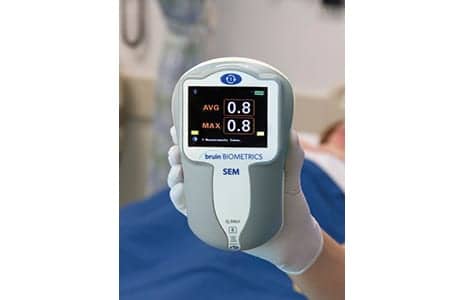A handheld scanner that detects sub-epidural moisture outperformed daily visual assessments in detecting pressure damage to skin for up to 20 days in a study conducted in the United States and Great Britain. Bruin Biometrics (BBI), the Los Angeles-based manufacturer of the technology, has filed for approval from the U.S. Food and Drug Administration to market the device in the United States and elsewhere, according to a media release from BBI.
The study’s investigators presented topline results June 20 at the scientific session of Wound Care: From Innovations to Clinical Trials 2017.
Sub-Epidural Scanner: The Clinical Evidence
Participants included 182 patients at risk for bedsores at 12 hospitals, nursing homes, and long-term rehabilitation centers in the United States and the United Kingdom. For up to 20 days, researchers conducted daily visual assessments and scans on the participants’ skin.
The researchers suggest that the sub-epidural moisture (SEM) Scanner was able to detect pressure damage to the skin earlier than the visual skin evaluation by nurses, according to the BBI media release.
“The study results indicate that the SEM Scanner can detect changes before they are visible,” says Henry Okonwo, a study investigator providing skilled wound care to nursing homes and acute care facilities in the United States, in the release. “Objective, scientific data from the scanner would give me confidence to take action in my clinical practice.”
“With these new findings, we expect that early detection technology will move to the forefront of bedsore prevention,” states Rachael Lester, BBI’s vice president of product. “The holy grail in prevention has been the search for a biophysical indicator that could reliably signal the presence of a condition at an early enough stage to meaningfully alter a patient’s prognosis. Our SEM Scanner technology uses sub-epidermal moisture, or SEM, to monitor changes occurring at the cellular level where there is pressure damage.”
“We hope that today is a turning point in the war on pressure ulcers,” BBI CEO Martin Burns declares. “We aim to massively decrease unnecessary patient injury and cost through a simple bedside scan that can detect developing wounds when they are at a preventable stage.”
These study findings are included in a filing to the US Food and Drug Administration seeking approval to market the device in the United States. The SEM Scanner currently has CE Mark approval and is available in the United Kingdom, Ireland, and Canada.
[Source(s): Bruin Biometrics LLC, PR Newswire]





